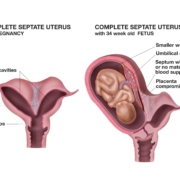Exercising During Pregnancy
Exercising During Pregnancy
All women who are pregnant without complications should be encouraged to keep up their normal daily physical activity or strength-conditioning exercises as part of a healthy lifestyle during their pregnancy. Pregnancy might seem like the perfect time to sit back and relax. You likely feel more tired than usual, and your back might ache from carrying extra weight. Exercise is not dangerous for your baby. There is some evidence that active women are less likely to experience problems in later pregnancy and labor. The more active and fit you are during pregnancy, the easier it will be for you to adapt to your changing shape and weight gain. Maintaining a regular exercise routine throughout your pregnancy can help you stay healthy and feel your best. It will also help you to cope with labor and get back into shape after the birth.
Who Should Not Exercise During Pregnancy?
For those that have medical problems, such as asthma, heart disease, diabetes, low placenta, bleeding or spotting, previous premature births, or a history of early labor, exercise may not be advisable.
Talk with your doctor before beginning an exercise program. They can also give you personal exercise guidelines, based on your medical history.
What Exercises Are Safe During Pregnancy?
Most exercises are safe to perform during pregnancy, as long as you exercise with caution and do not overdo it. Do not exhaust yourself. You may need to slow down as your pregnancy progresses.
- Dancing
- Swimming
- Water aerobics
- Yoga, stretching, and other floor exercises
- Pilates
- Biking
- Brisk walking
- Indoor stationary cycling
- pregnancy exercise classes
As a general rule, you should be able to hold a conversation as you exercise when pregnant. If you become breathless as you talk, then you’re probably exercising too strenuously.
Exercise tips during pregnancy
If you have been cleared to exercise, and you participated in physical activity before you were pregnant, it is recommended that you:
- Always warm up before exercising, and cool down afterward
- At least 30 minutes of moderate-intensity physical activity, try to keep active on a daily basis
- Listen to your body. Let your body be your guide.
- If you are healthy and you are not experiencing complications in your pregnancy, continue this level, or until it becomes uncomfortable for you to do so.
- Drink plenty of water and other fluids
- Try swimming because the water will support your increased weight.
- Consult and be guided by your doctor, physiotherapist, or healthcare professional.
Benefits of exercise during pregnancy
- Reduce backaches, constipation, bloating, and swelling
- Boost your mood and energy levels
- Help you sleep better
- Prevent excess weight gain
- Promote muscle tone, strength, and endurance
- Decreased risk of pregnancy complications such as pre-eclampsia and pregnancy-induced hypertension
- Faster recuperation after labor
- Prevention and management of urinary incontinence
- Improved circulation
- Lower risk of gestational diabetes
- Shortened labor
- Reduced risk of having a C-section
Exercises to avoid while pregnant
- abdominal trauma or pressure; such as weightlifting
- Activities where falling is likely (such as skiing and horseback riding).
- extreme balance, coordination, and agility; such as gymnastics
- significant changes in pressure – such as SCUBA diving
- heavy lifting
- wide squats or lunges.
- Holding your breath during any activity.
- Activities that require extensive jumping, hopping, skipping, bouncing, or running.
- Deep Knee bends, full sit-ups, double leg raises, and straight-leg toe touches.
- Waist-twisting movements while standing.
- Heavy exercise spurts followed by long periods of no activity.
- Exercise in hot, humid weather.
Warning signs when exercising during pregnancy
Stop exercising and consult your health care provider if you:
- Feel chest pain
- Have a headache
- dizziness or feeling faint
- heart palpitations
- chest pain
- swelling of the face, hands, or feet
- calf pain or swelling
- vaginal bleeding
- contractions
- deep back, pubic or pelvic pain
- cramping in the lower abdomen
- an unusual change in your baby’s movements
- amniotic fluid leakage
- unusual shortness of breath
- excessive fatigue
- muscle weakness
Regular exercise can help you cope with the physical changes of pregnancy and build stamina for the challenges ahead. If you haven’t been exercising regularly, use pregnancy as your motivation to begin. If you’re not sure whether a particular activity is safe during pregnancy, check with your healthcare professional. Always talk to your doctor before beginning any exercise program. Once you’re ready to get going.
Disclaimer
The information, including but not limited to, text, graphics, images and other material contained on this website are for informational purposes only. The purpose of this website is to promote broad consumer understanding and knowledge of various health topics. It is not intended to be a substitute for professional medical advice, diagnosis, or treatment. Always seek the advice of your physician or another qualified healthcare provider with any questions you may have regarding a medical condition or treatment before undertaking a new health care regimen, and never disregard professional medical advice or delay in seeking it because of something you have read on this website.
References:
https://kidshealth.org/en/parents/exercising-pregnancy.html





 ToronTek
ToronTek 





Leave a Reply
Want to join the discussion?Feel free to contribute!